In the dynamic landscape of Australian mega ports, where over 1.6 billion tonnes of cargo traverse our waters annually, every minute counts. Port executives face unprecedented challenges: vessels are growing larger, supply chains more complex, and stakeholder expectations increasingly demanding. Yet, amidst these challenges lies an opportunity for transformation.
Consider Port Botany's recent struggle with container dwell times reaching critical levels. The solution? It wasn't about adding more space or personnel—it was about leveraging the power of data through innovative mobile applications.
Today's port managers need more than experience; they need real-time insights, predictive capabilities, and seamless coordination across their entire operation. This is where cutting-edge mobile app development emerges as a game-changing solution, empowering ports to make data-driven decisions that enhance efficiency, reduce costs, and maintain their competitive edge in the global maritime landscape.
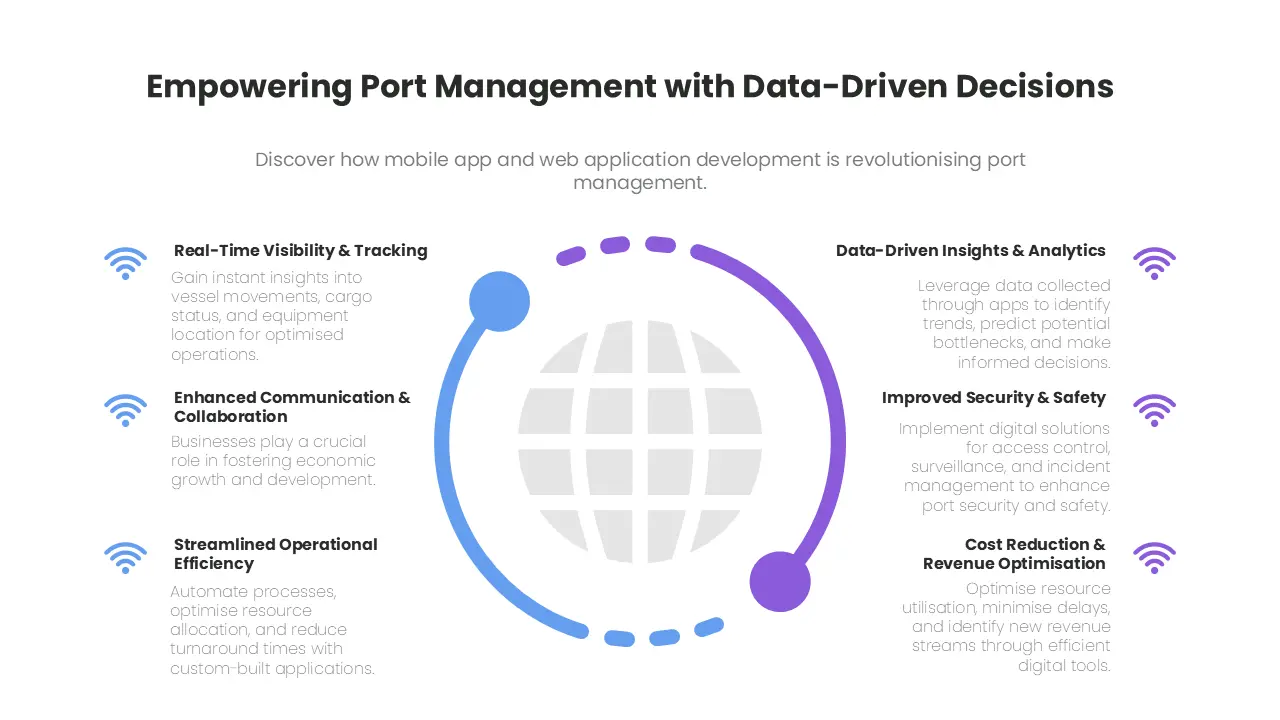
The Power of Data in Port Management: Unlocking Insights with Mobile Technology
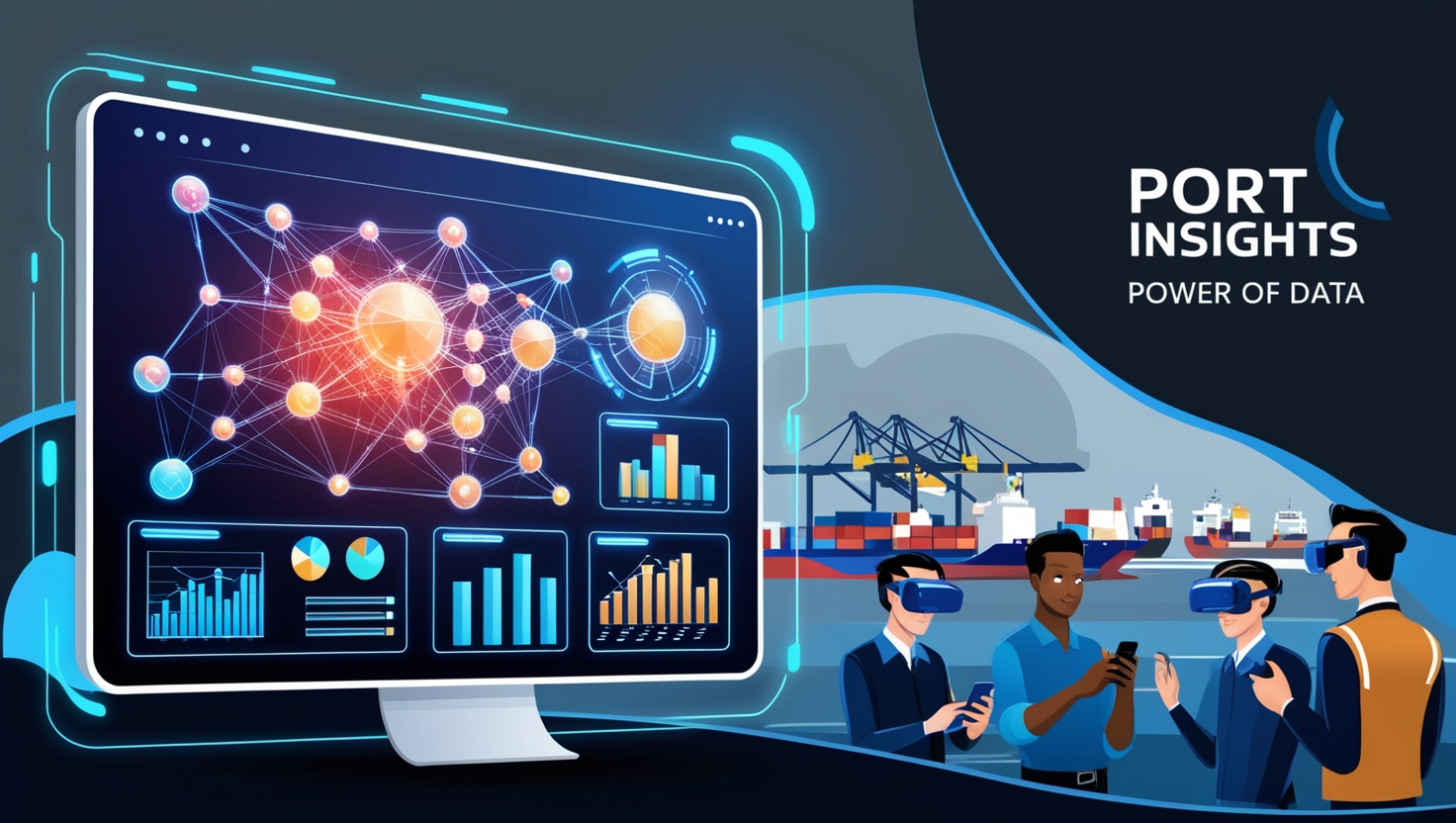
In the modern maritime world, data is king. Ports generate a constant stream of information, from vessel movements and cargo locations to equipment performance and weather conditions. Mobile app developers are harnessing this data to create powerful tools that revolutionise port management, providing real-time visibility, boosting operational efficiency, and enabling predictive analytics.
Real-Time Visibility: A Clear View of Your Entire Operation
Imagine having a bird's-eye view of your entire port operation, accessible at your fingertips. Mobile apps make this a reality, offering:
- Live Vessel Tracking with Precise ETA Calculations: Track the exact location and estimated arrival time of every vessel in your port, allowing for proactive planning and resource allocation.
- Real-time Container Location and Status Updates: Know the precise location and status of every container within your terminal, eliminating guesswork and minimising delays.
- Immediate Alerts for Potential Delays or Bottlenecks: Receive instant notifications about potential disruptions, enabling proactive intervention and minimising their impact on your operations.
- Dynamic Resource Allocation Based on Current Port Conditions: Optimise resource allocation in real-time based on current conditions, such as vessel traffic, weather patterns, and equipment availability.
Operational Efficiency: Streamlining Processes, Boosting Productivity
Mobile apps are transforming port operations by streamlining processes, automating tasks, and optimising resource utilisation. The results are impressive:
- Automated Berth Scheduling: Reduce vessel waiting times by up to 35% with intelligent algorithms that dynamically allocate berths based on real-time data and predicted arrival times.
- Smart Resource Allocation: Optimise equipment utilisation by up to 40% by tracking equipment location and usage patterns, ensuring the right equipment is in the right place at the right time.
- Paperless Documentation Processes: Slash processing times by up to 60% by digitising documentation workflows, eliminating manual data entry, and streamlining approvals.
- Integrated Workflow Management: Improve coordination and efficiency across your entire terminal by integrating workflows and automating tasks, from cargo handling to gate operations.
Predictive Analytics: Anticipating Challenges, Optimising Performance
Forward-thinking ports are leveraging mobile apps with advanced analytics to gain a competitive edge. This includes:
- Forecasting Potential Congestion Points: Predict potential bottlenecks and congestion points 48-72 hours in advance, allowing you to proactively adjust operations and mitigate disruptions.
- Optimising Maintenance Schedules: Analyse equipment usage patterns to predict maintenance needs and optimise schedules, minimising downtime and extending equipment lifespan.
- Predicting Weather Impacts: Integrate weather data and predictive models to anticipate the impact of weather events on port operations, enabling proactive planning and minimising disruptions.
- Analysing Historical Data to Improve Future Planning: Leverage historical data to identify trends, optimise resource allocation, and improve decision-making for future operations.
Enhanced Communication: Breaking Down Silos, Fostering Collaboration
Mobile apps are transforming communication within the port ecosystem, fostering collaboration and improving efficiency. This includes:
- Creating a Unified Platform for All Stakeholders: Connect all stakeholders, from port authorities and terminal operators to shipping lines and agents, on a single platform, facilitating seamless information sharing.
- Enabling Instant Messaging and Alerts: Facilitate real-time communication across the port ecosystem with instant messaging and alert functionalities, ensuring everyone stays informed and connected.
- Facilitating Real-Time Collaboration Between Teams: Enable real-time collaboration between different teams within the port, improving coordination and efficiency.
- Streamlining Documentation Sharing and Approval Processes: Digitise and streamline documentation workflows, facilitating faster approvals and reducing delays.
By partnering with skilled mobile app developers, ports can unlock the power of data to optimise their operations, improve efficiency, and enhance communication across the entire maritime ecosystem.
Mobile App Features for Port Management: Unlocking Efficiency at Your Fingertips
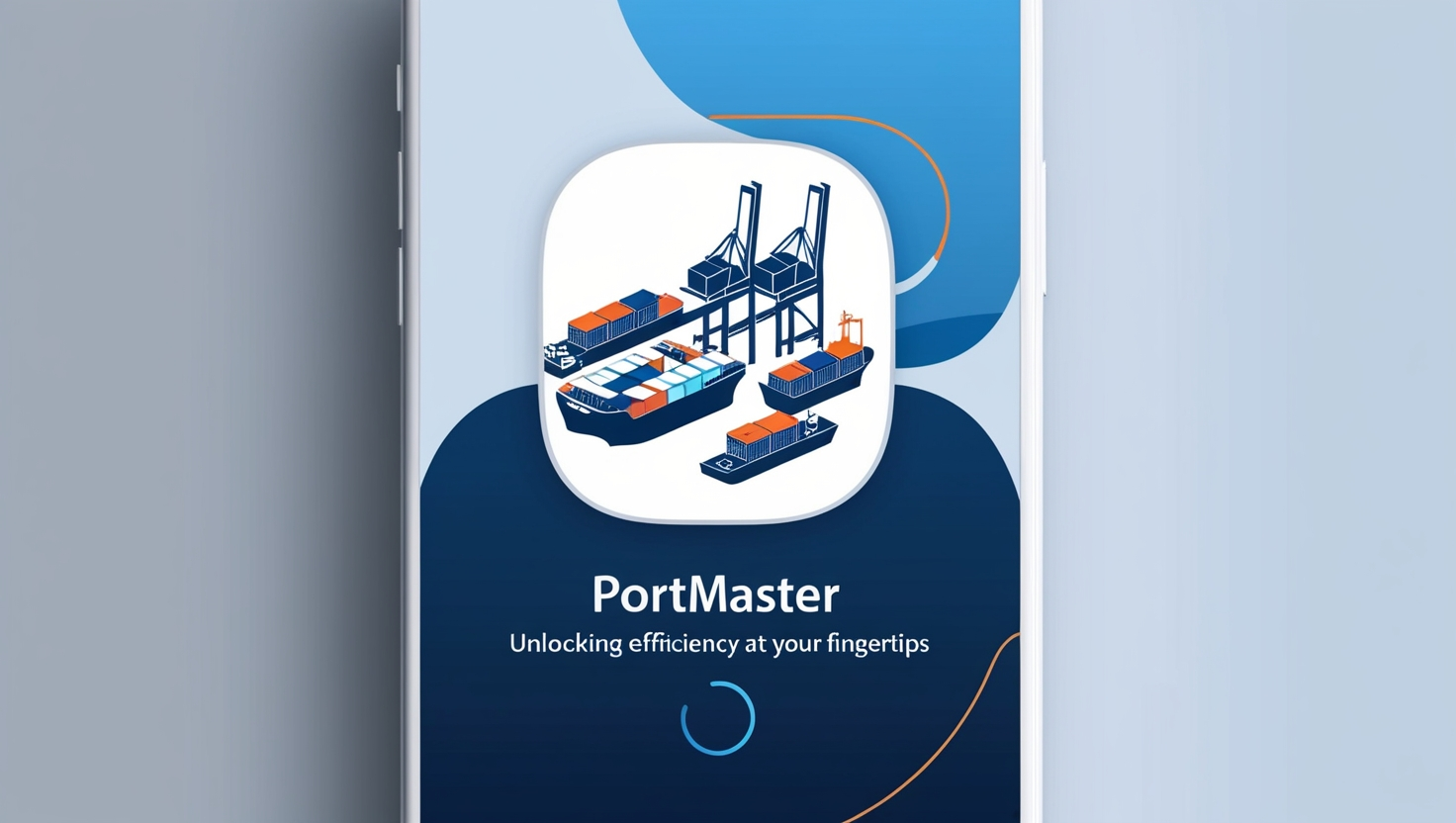
In today's fast-paced maritime world, staying ahead of the curve is crucial. Mobile app developers are revolutionising port management by delivering powerful tools that streamline operations, enhance communication, and boost overall efficiency. Here's a glimpse of the essential features that a modern port management app can offer:
Cargo Tracking: Transparency and Control in the Palm of Your Hand
Gone are the days of manual tracking and endless paperwork. Mobile app developers can integrate cutting-edge technology to provide:
- Real-time Container Tracking with GPS Integration: Pinpoint the exact location of your containers at any given moment, ensuring complete transparency throughout the supply chain.
- Automated Notifications for Status Changes: Receive instant updates on container movements, delays, or any other critical events, enabling proactive decision-making.
- Digital Documentation Management: Say goodbye to cumbersome paper trails. Store, manage, and access all your cargo documents digitally, from bills of lading to customs declarations.
- Custom Reporting and Analytics Dashboards: Gain valuable insights into your cargo operations with comprehensive reporting and analytics tools, allowing you to identify trends, optimise processes, and improve efficiency.
Vessel Management: Smooth Sailing with Smart Technology
Efficient vessel management is vital for optimising port operations. Mobile app developers can equip you with:
- Dynamic Berth Allocation Algorithms: Optimise berth utilisation and minimise vessel turnaround time with intelligent algorithms that dynamically allocate berths based on real-time data.
- Real-time Vessel Traffic Monitoring: Maintain a clear picture of vessel movements within your port and surrounding waters, enhancing safety and efficiency.
- Automated ETA Calculations: Accurately predict vessel arrival times based on real-time data, facilitating better planning and resource allocation.
- Pilot Scheduling and Management: Streamline pilot scheduling and communication, ensuring smooth and timely vessel arrivals and departures.
- Integration with AIS Data: Leverage Automatic Identification System (AIS) data to enhance vessel tracking, improve situational awareness, and optimise traffic flow.
Terminal Operations: Maximising Productivity on the Ground
Mobile apps can transform your terminal operations with features like:
- Yard Space Optimisation: Maximise yard space utilisation and improve container stacking efficiency with intelligent algorithms and real-time data visualisation.
- Equipment Tracking and Utilisation Monitoring: Track the location and utilisation of your terminal equipment, such as cranes, straddle carriers, and trucks, to optimise resource allocation and minimise downtime.
- Labour Allocation and Scheduling: Effectively manage your workforce by optimising labour allocation and scheduling based on real-time operational needs.
- Gate Automation Integration: Streamline gate processes with mobile app integration, allowing for faster truck turnarounds and reduced congestion.
- Maintenance Scheduling and Tracking: Schedule and track preventative maintenance for your terminal equipment, ensuring optimal performance and minimising costly breakdowns.
Performance Monitoring: Data-Driven Insights for Continuous Improvement
Harness the power of data to drive continuous improvement in your port operations. Mobile app developers can provide:
- Custom KPI Dashboards: Monitor key performance indicators (KPIs) tailored to your specific goals and objectives, providing a clear overview of your port's performance.
- Real-Time Performance Metrics: Access real-time data on key metrics such as vessel turnaround time, container dwell time, and berth utilisation, enabling proactive decision-making.
- Historical Data Analysis: Analyse historical data to identify trends, bottlenecks, and areas for improvement, allowing you to optimise your operations over time.
- Automated Reporting Capabilities: Generate automated reports on key performance metrics, saving time and effort while ensuring consistent data analysis.
- Benchmark Comparisons: Compare your port's performance against industry benchmarks, identifying areas where you excel and areas where you can improve.
Communication and Collaboration: Connecting Your Maritime Ecosystem
Effective communication is crucial for smooth port operations. Mobile app developers can facilitate seamless collaboration with:
- Secure Messaging Systems: Enable secure and efficient communication between port staff, vessel crews, and other stakeholders.
- Task Management Capabilities: Assign and track tasks, ensuring efficient workflow management and accountability across your team.
- Document Sharing and Approval Workflows: Streamline document sharing and approval processes, improving collaboration and reducing delays.
- Emergency Notification Systems: Quickly disseminate critical information in case of emergencies, ensuring the safety and security of your port.
- Stakeholder Portals: Provide dedicated portals for different stakeholders, such as shipping lines, agents, and customs officials, facilitating seamless information sharing and collaboration.
By partnering with skilled mobile app developers, you can unlock the full potential of technology to optimise your port operations, improve efficiency, and enhance communication across your maritime ecosystem.
Choosing the Right Mobile App Developers for Your Port
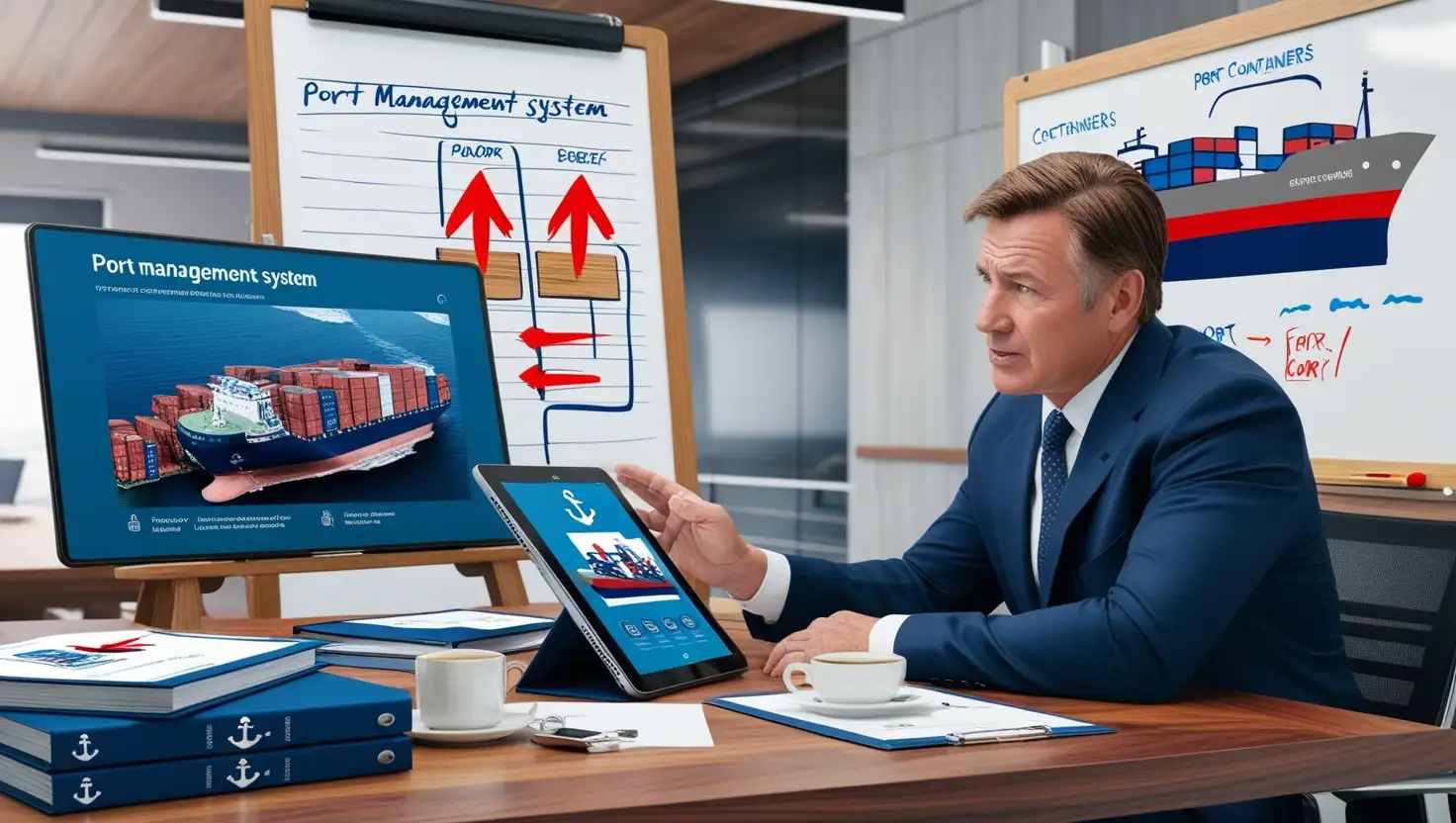
Looking to streamline operations, improve efficiency, and boost communication within your port? Mobile app developers can help you unlock the power of technology to optimise your processes. But with so many options out there, how do you choose the right development partner for your specific needs?
Expertise: Navigating the Maritime Landscape
When it comes to port management, generic app developers simply won't cut it. You need a team with specialised knowledge and experience in the maritime industry. Here's what to look for:
- Proven Experience in Maritime Software Development: Seek out mobile app developers with a demonstrated history of creating successful solutions for ports, shipping companies, or other maritime organisations.
- Deep Understanding of Port Operations and Logistics: Your ideal partner should grasp the complexities of port activities, including vessel traffic management, cargo handling, and supply chain logistics.
- Track Record of Successful Implementations: Don't hesitate to ask for case studies or testimonials from previous clients in the maritime sector.
- Knowledge of Maritime Regulations and Compliance Requirements: Ensure your chosen developers are well-versed in relevant industry standards and regulations, such as those related to safety, security, and environmental protection.
Customisation: Tailoring Solutions to Your Port
Every port is unique, with its own set of challenges and objectives. The right mobile app developers will offer:
- Tailored Solutions for Your Specific Port Requirements: Avoid "one-size-fits-all" approaches. Look for developers who take the time to understand your individual needs and design a solution that fits your port like a glove.
- Scalable Architecture for Future Growth: As your port expands and evolves, your technology should be able to keep pace. Choose a development partner who can provide a scalable architecture that accommodates future growth and changes in demand.
- User-Centric Design Approach: Your app should be intuitive and easy to use for all stakeholders, from port workers to vessel captains. Prioritise developers who focus on user experience (UX) and design with the end-user in mind.
- Flexible Development Methodology: Agile development methodologies allow for flexibility and adaptability throughout the project, ensuring your app meets your evolving needs.
Integration: Connecting the Dots
Seamless integration with your existing port systems is crucial for maximising efficiency and avoiding data silos. Ensure your chosen mobile app developers can provide:
- Seamless Integration with Existing Port Systems: Your new app should integrate smoothly with your current software and hardware infrastructure, including terminal operating systems (TOS), vessel traffic systems (VTS), and other critical platforms.
- API Development Capabilities: Application Programming Interfaces (APIs) enable different systems to communicate with each other. Your developers should have strong API development skills to ensure seamless data exchange between your app and other port systems.
- Experience with Maritime Industry Standards: Choose developers familiar with relevant data exchange standards and protocols used in the maritime industry, facilitating interoperability between different systems.
- Support for Legacy System Migration: If you're dealing with older legacy systems, your development partner should be able to assist with data migration and ensure compatibility with your new app.
By carefully considering these factors, you can choose the right mobile app developers to transform your port operations, improve efficiency, and enhance communication across your maritime ecosystem.
Conclusion
As Australian ports continue to grow and evolve, the role of mobile technology in driving operational excellence becomes increasingly critical. The implementation of custom mobile solutions isn't just about digitalisation—it's about creating a competitive advantage in a global marketplace.
The future of port management lies in the intelligent application of data-driven technologies. From AI-powered predictive analytics to IoT integration and autonomous operations, mobile applications will continue to be the cornerstone of modern port management.
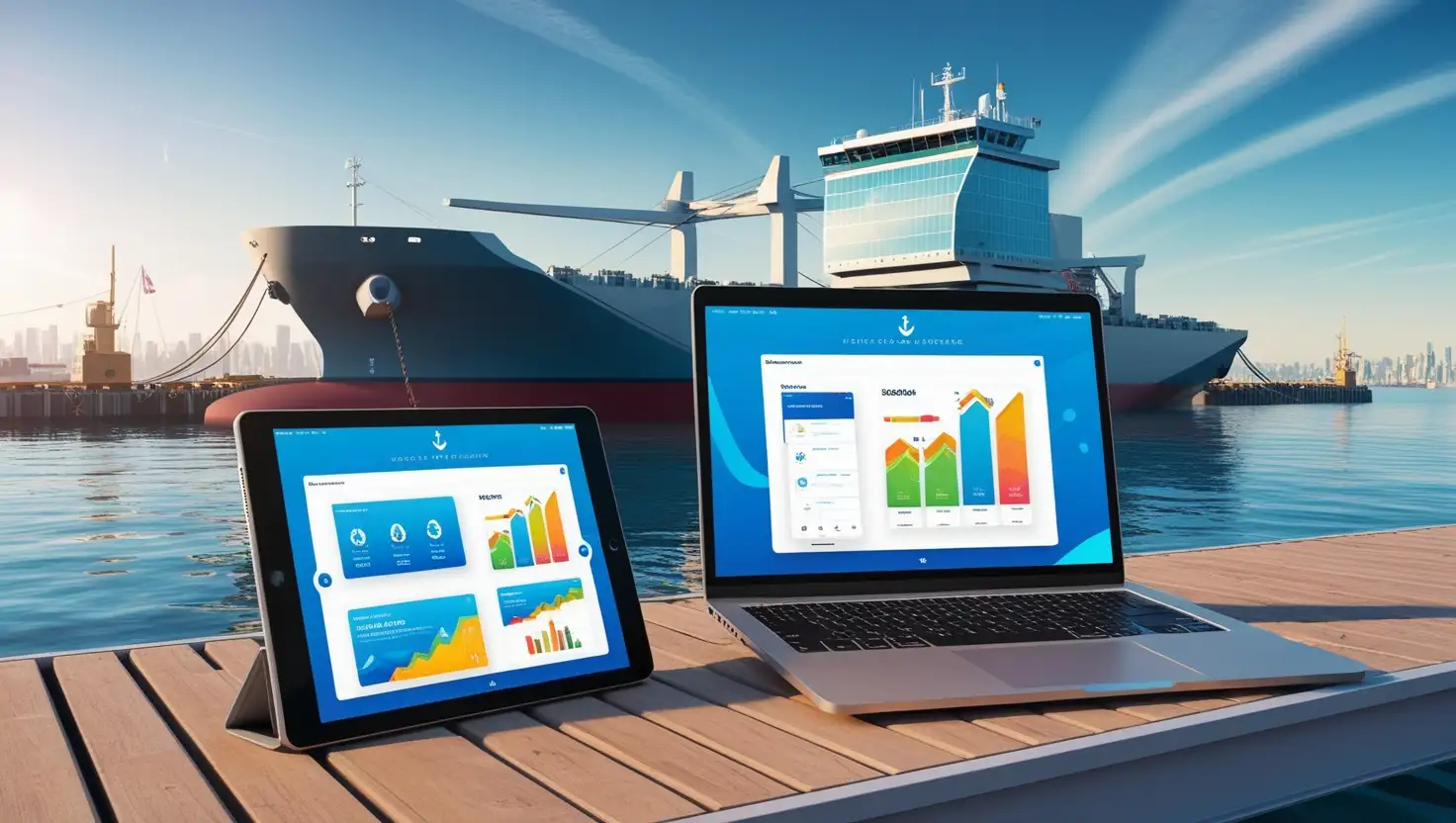
Transform your port operations with C9's expertise in maritime mobile solutions. As Australia's leading developer of custom port management applications, we understand the unique challenges and opportunities in your industry.
Take the first step towards operational excellence:
1. Schedule a Free Consultation: Contact our maritime technology experts for a comprehensive assessment of your port's digital needs.
2. Request a Demo: See our port management solutions in action and learn how they can be customised for your operations.
3. Start Your Digital Transformation: Join the growing number of Australian ports leveraging C9's expertise to enhance their operations.
Contact us today:
➡️ Website:
Mobile App Developers Service
Web Application Developers Service
Web Application & Mobile App Development Services: Transforming Digital Solutions
In today's fast-paced digital landscape, organisations require robust web applications and Mobile App solutions to maintain their competitive edge. C9 specialises in delivering cutting-edge development services that harmonise innovation with practical business outcomes. Our comprehensive development approach ensures that each solution is tailored to meet unique organisational challenges whilst maintaining the highest standards of security, scalability, and user experience.
Take a moment to explore our diverse portfolio of success stories and discover how C9 has helped leading businesses across various sectors revolutionise their digital presence. From startups to established enterprises, we've partnered with organisations to create bespoke solutions that drive growth and optimise operational efficiency.
Let's explore how we've helped these innovative companies succeed in their digital transformation journey. Check out our impressive list of partners and clients below to see the real-world impact of our web application and software development expertise.
References
1. Australian Ports Association. (2024). "Annual Port Performance Report 2023"
2. Maritime Industry Australia Limited. (2024). "Digital Transformation in Australian Ports"
3. Port of Brisbane. (2023). "Digital Innovation Strategy Report"
4. International Maritime Organization. (2024). "Guidelines for Port Digital Infrastructure"
5. World Port Sustainability Program. (2024). "Digital Port Management Best Practices"
Mobile App Development Insights
Stay ahead in the dynamic world of mobile app development with our expert insights, tutorials, and best practices. From innovative UI/UX design to cross-platform development strategies, discover how to build powerful, user-friendly applications that stand out in today's competitive market.
The Growing Importance of Mobile Payments: How Australian Businesses Can Embrace Mobile Payment Technology
Avoid These Costly Mistakes When Hiring Mobile App Developers
Top 15 Mobile App Developers FAQs Answered by C9 Experts
Unlocking the Power of AI: How Mobile Apps Can Transform Your Aussie Business
Top 15 Mobile App Upgrades & Redevelopment FAQs Answered by C9
Mobile App Development FAQ answered by C9
Developing a Strategic Mobile App for Business Growth
Securing Your Web App: Best Practices for Australian Businesses
Top 15 Product & SaaS Development FAQs Answered by C9
Explore More Transformative Solutions Through Our Managed Services
Hungry for more transformative insights? Our Managed Services content hub is your gateway to operational excellence. From strategic frameworks to success stories, we've curated invaluable resources that showcase how leading organisations are revolutionising their operations through our expertise.
Explore our knowledge base to unlock your next competitive advantage. Your digital evolution starts here.
Reliable Managed Data, Application Maintenance & Support Services in Australia
Sydney Businesses Trusted Managed Service Provider for Scalable IT Solutions
Melbourne Businesses Trusted Managed Service Provider for Scalable IT Solutions
Expert Web App Developers Sydney: Building Tailored Solutions for Your Business
Dive Deeper into Innovative Mobile App Solutions with Our Managed Services
Craving more insights into groundbreaking mobile app development? Our **Managed Services** are designed to propel your business forward. Our content hub offers a wealth of knowledge:
- Strategic Insights: Gain access to expert frameworks that guide your mobile app strategy.
- Exclusive Resources: Uncover unique resources that reveal how top organizations are leveraging mobile technology for operational excellence.
Unlock your competitive edge in the mobile-first world. Explore our knowledge base and kickstart your digital transformation journey today. Your next level in mobile app innovation begins here.
Australian Cross-Platform Mobile App Developers: Faster Development with Lower Cost
Brisbane's Premier iPhone/iOS App Developers
Brisbane's Mobile Innovation Architects: Android App Development
Transform Your Mobile Applications: Brisbane's Enterprise Modernisation Experts
Melbourne's Premier Cross Platform App Developers
Transform Your Business with Melbourne's Elite iOS App Development
Android App Development in Melbourne: Strategic Mobile Solutions
Revitalise Your App in Melbourne
Cross Platform App Developers in Sydney
Transform Your Business with Sydney's Premier iPhone App Development
Sydney's Strategic Android App Development Partners
Elevate Your App in Sydney
Application Maintenance & Support in Brisbane
Application Maintenance & Support Services in Melbourne
Melbourne's Premier Cross Platform App Developers
Navigating Australia's Mobile Payment Revolution: A Strategic Guide for Businesses by C9 Experts
Decoding Mobile App Development: Expert Answers to Common Questions (Australian Perspective)
CMS & E-Commerce: Architecting Digital Commerce Ecosystems Beyond Conventional Boundaries
Where standard e-commerce platforms constrain, our bespoke CMS and E-Commerce solutions liberate Australian organisations to forge distinctive digital experiences. We transcend conventional implementation—crafting precision-engineered commerce ecosystems that seamlessly align with your unique business model and customer engagement strategy.
Our approach transforms restrictive templated storefronts into dynamic commercial environments through strategic architecture, tailored development, and seamless integration. This isn't merely about launching a website—it's about engineering a commercial advantage that empowers your organisation to deliver frictionless transactions while capturing invaluable customer intelligence.
Expert Website CMS Brisbane & E-Commerce Development
Experienced CMS & E-Commerce Developers in Melbourne
Professional CMS & E-Commerce Developers in Sydney
Navigating the Digital Frontier: Web Solutions That Drive Business Growth
C9 emerged as a critical technological partner for local businesses seeking to transform their digital presence through innovative web application development. Serving the Australia metropolitan area, the company bridges the gap between complex digital transformation needs and practical business requirements by delivering custom web solutions that enhance operational efficiency, customer engagement, and competitive positioning. By combining deep local market understanding with advanced web development technologies, C9 provides comprehensive services ranging from initial strategy and design to full-scale application development and ongoing support. Their approach transcends traditional web development, focusing on creating intelligent, scalable web applications that not only solve immediate business challenges but also provide strategic digital infrastructure capable of adapting to evolving market demands and technological landscapes. C9's mission centers on empowering local businesses with enterprise-grade web technologies, enabling even small and medium-sized organizations to compete effectively in an increasingly digital marketplace.
Unleash Your Team's Productivity: Custom Web Application Development Solutions that Streamline Workflows
Beyond the Basics: A Comprehensive Guide to Fortifying Web Applications for Australian Businesses in 2025
Beyond Remote Work: Unpacking How Web Application Developers are Architecting the Future of Productive Australian Workplaces in 2025
The Australian Digital Transformation: How Bespoke Web Applications, Driven by Local Expertise, are Revolutionising the Workplace
The Foundational Role of Web Application Developers in Australia's Evolving Workplace
Chatbots, Teams Apps & Website Development Brisbane | C9
Complex Website Development Services in Brisbane | C9
Custom Web & Software Development Brisbane | C9
Melbourne Complex Web Development | C9
Web Application & Software Development Melbourne | C9
Expert Complex Web Development Services in Sydney | C9